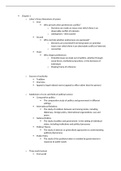Chapter 1
o Lukes’s three dimensions of power
First
Who prevails when preferences conflict?
o Decisions are made on issues over which there is an
observable conflict of interests.
o Lobbypower / direct power
Second
Who controls whether preferences are expressed?
o Decisions are prevented from being taken on potential
issues over which there is an observable conflict of interests.
o censorship
Third
Who shapes preferences
o Potential issues are kept out of politics, whether through
social forces, institutional practices, or the decisions of
individuals
o Shaping frame of reference
o Sources of authority
Tradition
Charisma
Appeal to legal-rational norms (appeal to office rather than the person)
o Subdivision of core sub-fields of political science
Comparative politics
The comparative study of politics and government in different
settings
International Relations
The study of relations between and among states, including
diplomacy, foreign policy, international organizations, war and
peace
National Politics
The study of politics and government in the setting of individual
states, including institutions and political processes
Political Theory
The study of abstract or generalized approaches to understanding
political phenomena
Public Policy
The study of the positions taken or avoided by governments in
response to public needs
o Three world system
First world
, Wealthy democratic industrialized states, most of which were
partners of the west in the cold war
Second world
(post)Communist systems
Third world
Poorer, less democratic, less developed states
o Aristotle's state typology
Rule of one Rule by few Rule by many
Genuine form Monarchy aristocracy Polity
Perverted form Tyranny Oligarchy Democracy
Chapter 3
o Comparative methods
Case study method
One case
Focus lies on the case
Intensive study of a single instance with wider significance
o Representative
Main subcategory
e.g. coalition government in Finland
o Prototypical
Research about a rising subject that is not yet
mainstream
e.g. advanced use of social media in US election
campaigns
o Exemplary
Research about the original archetype in a subject
e.g. research about the British Parliament, which is
the birthplace of Parliamentary governance
o Deviant
Research about odd one out-cases, peculiarities,
and deviants of the standard.
e.g. research about how myanmar still has strong
military political influence in a time where this is not
usual.
o Critical
Research that tests a theory in an environment least
hospitable to it
“if it’ll work here, it’ll work anywhere
e.g. democracy in Afghanistan
Qualitative
Multiple cases
Focus lies on the cases
Holistic comparison of two or more cases within their natural setting
, Limited number of cases are studied in depth
Tends to be descriptive rather than predictive
An effort is made to understand the interaction of multiple variables
Meaning is allowed to emerge from the objects of study
Observation is the main means of data collection
Phenomena are studied within their natural setting
Two methods of data selection
o Most Similar System (MSS)
Comparable to the ceteris paribus approach
o Most Different System (MDS)
To test a relationship between two factors by
discovering whether it can be observed in a range of
countries with contrasting political systems,
histories, cultures, etc., to check wether the
relationship between factors is real, and not due to
the dependence of both factors on an unmeasured
third variable.
Quantitative
Multiple cases
Focus lies on the variables
Statistical assessments of the relationships between variables
involving large numbers of cases
Large N
More variables
(standard statistical research)
Historical
Multiple cases
Focus on the process
Tracing of the process leading to a known outcome
Makes use of process tracing – study of the sequence of events
linking a cause to an effect
Assumes Path dependence – the idea that the outcome of a political
process depends on earlier decisions that lead down a particular
path
o Critical junctures – a turning point which establishes
interests, structures, or institutions persisting through time
Possible assumes Sequencing – the idea that the order of events,
and not merely their occurrence, affects the outcome of the path
Lastly, looks at Slow-moving causes – an influence which changes
slowly but, over a long period, dramatically – such as globalization
o Challenges of comparison
Counterfactuals
A thought experiment speculating on possible outcomes is a
particular factor had been absent from a process, or visa versa
Selection bias
A handicap to comparison which occurs when the units of analysis
are chosen intentionally rather than randomly, which causes the
, research to be unrepresentative for the population, rendering it un-
generalizable
(generalizable – ability to be accurately applied or extended to
situations or circumstances other than those originally studied)
Subcategories
o Survivorship bias
A form of bias that crops up when we study only
surviving examples of political types, overlooking
past examples.
e.g. only looking at surviving communist regimes,
forming them into a archetype, and disregarding the
communist regimes that have fallen
Value bias
o Allowing the research, be it in assessments, the choice of
facts, or conclusions, to be affected by the norms, values,
and perspective of the researcher
Confirmation bias
o The tendency to seek out information and interpret it in
ways that fit the predetermined hypothesis or mainstream
view
Chapter 5 – democratic rule
o Democracy – a political system in which government is based on a fair and open
mandate from all qualified citizens of a state
o Democratization – the process by which states build the institutions and processes
needed to become stable democracies
Steps of democratization
Liberalization of an authoritarian political regime
o Initiation of the reform sequence, usually as a result of
recognition by authoritarian rulers that change is inevitable
Transition
o Arrangements are made for the new system of government
Forming of constitution
Designing of institutions
Scheduling of elections
o Former elite will negotiate privileges, such as exemption
from prosecution
Consolidation
o Widespread acceptance of the new system, supported by
evidence that it works
Mostly after new elections
The process through which democratic practices
become habitual
Deepening
o Democracy evolves from the superficial to the substantial






